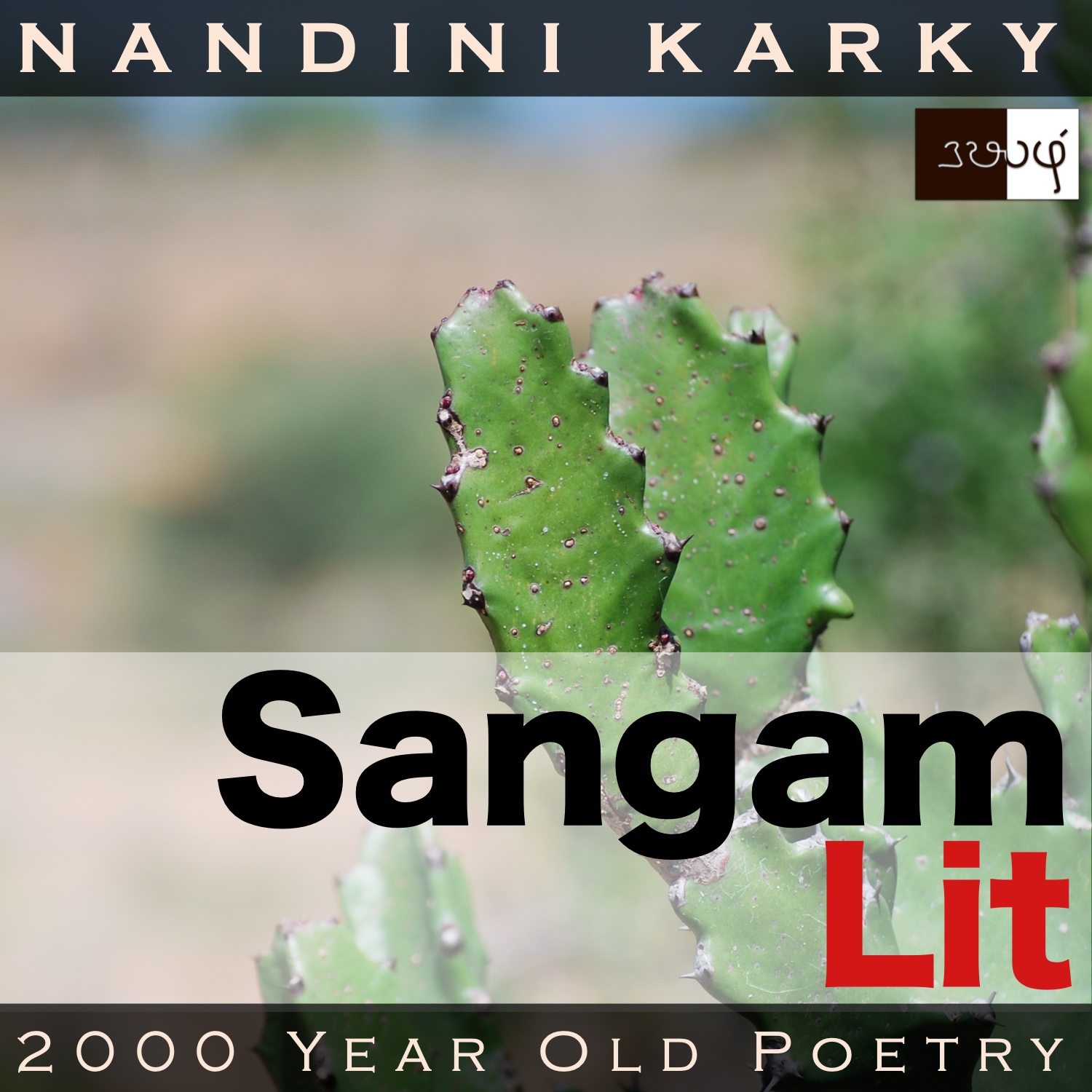Podcast: Play in new window | Download
Subscribe: Apple Podcasts | Spotify | Amazon Music | Android | iHeartRadio | Email | TuneIn | RSS | More

In this episode, we walk through the ancient paths of Sangam literary work, Natrinai 26, set in the ‘Paalai’ or the drylands, in the emotional words of the lady’s confidante to the man, conveying how his decision to leave affects the lady.
நோகோ யானே; நெகிழ்ந்தன வளையே-
செவ்வி சேர்ந்த புள்ளி வெள் அரை
விண்டுப் புரையும் புணர் நிலை நெடுங் கூட்டுப்
பிண்ட நெல்லின் தாய் மனை ஒழிய,
சுடர் முழுது எறிப்பத் திரங்கிச் செழுங் காய்
முட முதிர் பலவின் அத்தம், நும்மொடு
கெடு துணை ஆகிய தவறோ?-வை எயிற்று,
பொன் பொதிந்தன்ன சுணங்கின்,
இருஞ் சூழ் ஓதி, பெருந் தோளாட்கே.
We say hello to ‘வளை’ meaning ‘bangle’ yet again in our Sangam explorations. These bangles worn by women seems to have had a marked symbolism for the poets of the era. The bangle slips away when the woman is pining or even when she feels attracted to a man! This symbolism sees love investing the mind with such power that it can affect the body instantaneously, as in this case, shrinking the arms, to express sadness! With references to ‘நெல்’ meaning paddy and ‘பலவு’ or ‘பலா’, as the jackfruit is referred to, in modern Tamil, we can be assured of a something of a culinary tour as well. Another curious expression is ‘வை எயிற்று’ which we encountered in Natrinai 2, in describing the lady as one with sharp teeth. Apparently, that added quite the bite to Sangam verses! I wonder about the origin of this curious expression and hope to find an answer in the days to come.
The people who have walked these lands before us, explain that the scene unfolds when the lady’s confidante comes to know of the man’s intention to part away and go in search of wealth. Seeing that it would be possible for him to delay his departure, the lady’s confidante pulls at his heartstrings presenting emotionally the state of her friend, the lady. She says, “O lord, I’m filled with pain seeing my beloved friend’s bangles slip and fall in agony. Remember where she comes from? Her mother’s place wherein stands a huge granary on a firmly set, red sand floor, with white markings for the mountain-like mounds of paddy, filled to the full always. Leaving such opulence, she came with you through the scorching wasteland, where the sun’s rays had wilted and cracked the ripe fruits of the jackfruit trees all along the way. Was she wrong in trusting and following you thus? My friend with her sharp teeth, skin akin to gold, with her dark and flowing tresses and her handsome wide shoulders! I’m pained at how she’s wasting away at the mere thought of you parting from her.”
The first interesting spot on our self-guided tour, is the granary described by the lady’s confidante. In front of your eyes, you see a tall, rounded structure with a floor, firm and smooth, made of red sand. There, on the floor, you see many white marks towards the edges, marking the extent of the paddy heaped over there. The mounds of paddy themselves are said to soar like mountains, so high up. This could mean that the lady left her home perhaps in the agricultural lands or the ‘marutham’ and eloped to the drylands with her man. The lady’s confidante paints a stark contrast. There, lush abundance and here, an emptiness! The next spot is the walk through the ancient jackfruit forest. My mouth waters at the mere thought of catching a scent of this tree. Although the lady’s confidante says the scorching heat has wilted and cracked the ripe jackfruit, all I can focus on, is the scent that can be sensed miles away. Another thing that piques my curiosity is the expression ‘தாய் மனை’ which means ‘mother’s home’. Seeing such references, I search the web wondering if ancient Tamil societies could have been matriarchal. But all the research currently points that the Sangam societies were indeed patriarchal. However, such an expression could be taken as proof of the mother’s importance in ancient homes.
Finally, coming to the destination, we see that the woman’s plight is shown as an excuse and her past evoked to bring forth guilt in the man. I would like to dwell on this path of thought, that’s not there just in this ancient poem but something that we often tread on, even now. We compare our present to our past and in the words of that Tamil comedian say ‘எப்படி இருந்த நான் இப்படி ஆயிட்டேன்!’ meaning ‘Who I was! What I have become!’ Any comparison to another time can only yield heartache! For in hindsight, everything does look green and lush and the present, a parched dryland. But if we can taste the little pleasures of the now and believe in ourselves, anytime, anywhere can have that illusory charm of yesterday. Jackfruit, anyone?




Share your thoughts...